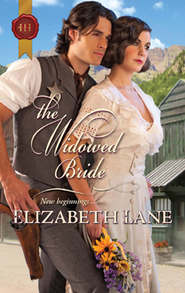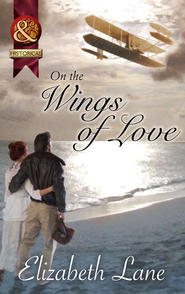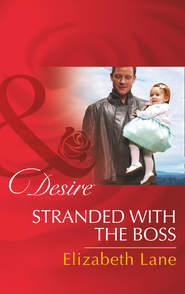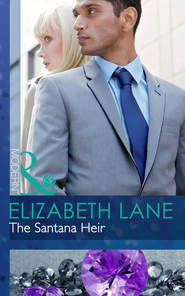По всем вопросам обращайтесь на: info@litportal.ru
(©) 2003-2024.
✖
Wyoming Woman
Настройки чтения
Размер шрифта
Высота строк
Поля
“I’ve been at school in Philadelphia for the past three years,” she said. “You and your sheep certainly weren’t around before I left.”
He sighed, as if resigning himself to a conversation he did not want to have. “I came here two years ago. My property butts onto the northwest corner of your family’s ranch, where those reddish foothills jut out onto the prairie.”
“In that case, I’m surprised my father hasn’t tried to buy you out,” Rachel said. “At a fair price, of course.”
Luke shrugged. “He has. Not in person, but through that little weasel of a land agent who comes sniffing around my place every few months.”
“Mr. Connell is a good man,” Rachel said. “My father has been dealing with him for years, and he’s never cheated us out of a penny…even though he does look a bit like a weasel.” She suppressed an impish smile. “What did you tell him when he made an offer on your land?”
“That I wouldn’t sell. Not even for a fair price.”
The edge in his reply was not lost on Rachel. “But why not?” she demanded. “You could run sheep in Nevada, or Colorado, or New Mexico, and nobody would care a fig! Why set up a sheep ranch smack in the middle of cattle country, where three-quarters of the people you meet are going to hate you?”
“Maybe because there’s no law that says I can’t.” He spoke in a flat voice that defied her to argue with him. “Do you play poker, Miss Rachel Tolliver?”
“Some.”
“I won my land in a poker game while you were probably still in pigtails,” he said. “Some rough years came and went before I was able to live on it. But it was my own piece of the earth. Whatever happened to me, it was always there, like a beacon to get me through the bad times.”
Rachel wondered about those bad times, but she knew better than to ask too many personal questions. Luke Vincente, she sensed, was a very private man who would not show his scars to unsympathetic eyes.
How old was he? she found herself wondering. He had the flat-bellied, lean-hipped body of a man in his early thirties and his hair carried only a light touch of silver. But his creased, windburned face had a hard set to it, as if his eyes had seen more than his mind wanted to remember.
“I understand how you must feel about the land,” she said.
“Do you?” he asked, clearly implying that Rachel would not know what it was like to get anything the hard way. She bridled, then willed herself to ignore the barb.
“But why raise sheep, for heaven’s sake?” she continued as if he hadn’t spoken. “Why not cattle, like the rest of us? Why make enemies of your neighbors?”
Luke’s gaze traced the spiraling flight of a red-tailed hawk against the sky. “You’ve never had to set up a cattle operation,” he said. “It takes big money these days, usually from some rich investor. And you need a whole crew of cowboys to take care of your herd—cowboys who have to be fed and housed and paid. And even if you get your cattle through the season and to the railhead in good shape, you can still lose your shirt if the market’s bad.”
Rachel gazed past his shoulder at the flowing mass of sheep and the darting figures of the two dogs. Everything Luke had said was true. Cattle raising was an expensive business. The old days, when a man could buy a cheap piece of land, drive a herd of longhorns north from Mexico and have himself a working ranch were long gone.
“Sheep, even purebreds like these, are cheaper to buy than cattle,” Luke said. “Sheep tend to multiply faster than cattle, and they can survive in country where cows would starve. With well-trained dogs, one or two men can handle a good-sized herd. Wool is easy to store, haul and ship, and the wool market is a hell of a lot more stable than the beef market. Does that answer your question?”
Rachel studied the dark diamond of perspiration that had soaked through the back of Luke’s faded chambray work shirt, outlining the taut muscles beneath the fabric. “I suppose it does answer my question,” she said slowly, although, in truth, it did not. She had set out to uncover the reasons behind his blazing hostility. Instead, his answers had revealed a man of burning ambitions, fierce loyalties and buried secrets. The things he had told her only served to deepen the puzzle that was Luke Vincente.
Rachel cleared her throat. “I still don’t—”
“Ssh!” She felt his body go rigid beneath her hands. “Listen!”
For the space of a breath, Rachel heard nothing but the rhythmic thud of the horse’s hooves against the damp earth. Then the sound reached her ears from beyond the next rise—the plaintive, terrified cry of a small animal in pain.
One of the dogs began to bark as Luke urged the horse to a canter. They came over the top of the rise to see a lamb, so small and white that it couldn’t have been more than a few days old, caught beneath a big clump of sagebrush. The little creature was dangling pitifully from one hind leg. It jerked and twisted, its eyes wild with terror. The dog hovered nearby, whining anxiously.
Luke swore as he halted the horse. Behind him, Rachel jumped to the ground, allowing him to swing out of the saddle. Reaching the lamb ahead of him, she gathered the squalling baby into her arms. That was when she saw the thin wire snare that had twisted around its hind leg. The lamb’s struggles had worked the wire into its tender flesh.
“There…you’re all right.” Rachel felt the unexpected sting of tears as she stroked the small, velvety head. She had no love for sheep, but this one was so tiny and helpless that its pain tore at her heart.
“Hold him still.” Luke had brought a pair of wire cutters. His eyes glittered with fury as he cut the lamb loose and, with gentle hands, untwisted the wire from its bleeding leg. “Damn the bastards,” he muttered under his breath. “Damn them all to hell!”
Rachel’s lips parted as she stared at him. Until now she’d assumed that the lamb had stumbled into a trap meant for rabbits or coyotes. But Luke’s face told her another story—a story that chilled the blood in her veins.
“Does this happen often?” She choked out the words.
Luke’s mouth tightened in a grim line. “This lamb was lucky. Most of them we find dead, or so far gone they have to be put out of their misery. The coyotes and eagles usually get to them before we do. I’ve lost more than two dozen animals to these hellish wire snares.”
Rachel gripped the struggling lamb as Luke cleaned its wounds. His big, weathered hands were callused and nicked with a myriad of scars—the kind of hands that had worked, fought, loved, maybe even killed. Where had those hands been, Rachel found herself wondering. What stories would those fingers tell if they could speak?
His knuckle brushed her breast through the damp fabric of her jacket. The accidental touch triggered a freshet of sensation that puckered her nipple and sent a jolt of liquid heat shimmering downward through her body. Rachel stifled a gasp, then forced herself to speak.
“You’re saying someone’s setting these snares just to catch your sheep?” she asked.
Luke had opened a pocket-sized tin of salve. His fingers rubbed the greasy mixture into the deep wire cuts in the lamb’s leg. He did not speak, but his grim silence was enough to answer Rachel’s question.
“But that’s monstrous!” she burst out. “Who would do such a thing?”
His eyes flickered toward her. Rachel felt their cold hatred as if shards of ice had penetrated her flesh. Her lips parted, but no words emerged from her dry mouth. The questions in her mind would remain un-asked. She did not want to hear Luke’s answers.
A frantic longing seized her—to be home, to be safe on the Tolliver Ranch, with this miserable after noon blotted from time as if it had never happened. She wanted to forget the buggy accident. She wanted to forget the helpless pain of the injured lamb. Most of all she wanted to forget this gruff, disturbing man who, through no fault of her own, had chosen to hate her on sight.
The dog that had found the sheep hovered close, brushing against Luke with its tail and looking up at Rachel with intelligent golden eyes. “What’s the matter, boy?” Rachel murmured. “Are you worried about your little lamb? He’ll be all right. We’ll fix him up as good as new.”
Luke’s stormy gaze flickered toward her, then shifted to the dog. “Go, Mick,” he commanded in a soft voice. “Back to the sheep.”
Tail high, the dog wheeled and bounded back down the slope in the direction of the herd. But it had only gone a few yards when, abruptly, it halted in its tracks, ears up, nose to the wind. Rachel saw the hair rise and bristle along the back of its neck. A nervous growl quivered in its throat.
Luke glanced up from doctoring the lamb, his body tense and wary. Rachel held her breath, holding the lamb close as she strained to catch the danger the dog had sensed.
Luke’s expression darkened. “Get out of sight!” he hissed, shoving her up the slope toward an outcrop of boulders. “Stay behind those rocks and don’t make a move until I tell you it’s safe!”
Only then did Rachel hear what had alarmed the dog. Faintly at first, but growing rapidly louder, the ominous cadence of galloping hoofbeats rumbled from the far side of the hill. Whoever the riders were, they were moving fast. Seconds from now they would be in sight.
With the lamb still clasped in her arms, she plunged toward the outcrop. If the mounted men proved to be friends, she could always show herself. But until she knew who they were and what they wanted, it made more sense to stay hidden.
By the time she reached the rocks, Luke was in the saddle. He spurred the horse toward the herd. The dog shot ahead of him, a dark blur of motion against the pale green slope.
Ignoring the pain in her shoulder, Rachel pressed herself into a low spot between two jutting boulders. The lamb squirmed against her. Rachel’s grip tightened around the warm little body as she edged into a spot where she could look down on what was happening.
Four mounted cowboys appeared over the crest of the hill, riding hard. Just below the ridge they halted for a moment, their attention fixed on the broad, open slope and the slowly moving sheep below. Rachel’s breath caught painfully as she realized that, beneath their broad-brimmed Stetsons, their neckerchiefs were pulled up to cover the lower parts of their faces. Everything was masked except their eyes.
One of the men jerked his pistol out of its holster. “Let’s get ’em, boys!” he shouted, firing into the air.
Whooping like savages, the four men charged down the hill toward Luke’s herd. All of them had their pistols drawn now, and for a heart-stopping moment Rachel expected them to start firing at the sheep, or even at Luke. But that was clearly not their intent. As they fanned out, shrieking wildly and shooting into the air, she realized they meant to stampede the sheep and drive them over the ledge, as the Indians had once driven buffalo.
Their plan was working all too well. As panic swept through the herd, the frantically bleating sheep began to mill in circles. A ram wheeled and bolted in dumb terror toward the unseen ledge. Others followed, and suddenly the whole herd was plunging blindly through the scrub, headed for certain destruction.
Rachel had lost sight of Luke. Now, suddenly, she saw him, racing his buckskin horse full out along the rim of the ledge. One of the dogs dashed ahead of him. The other was already tearing along the forefront of the herd, lunging at the leaders, snapping and biting as it dodged their butting heads and flying hooves.











